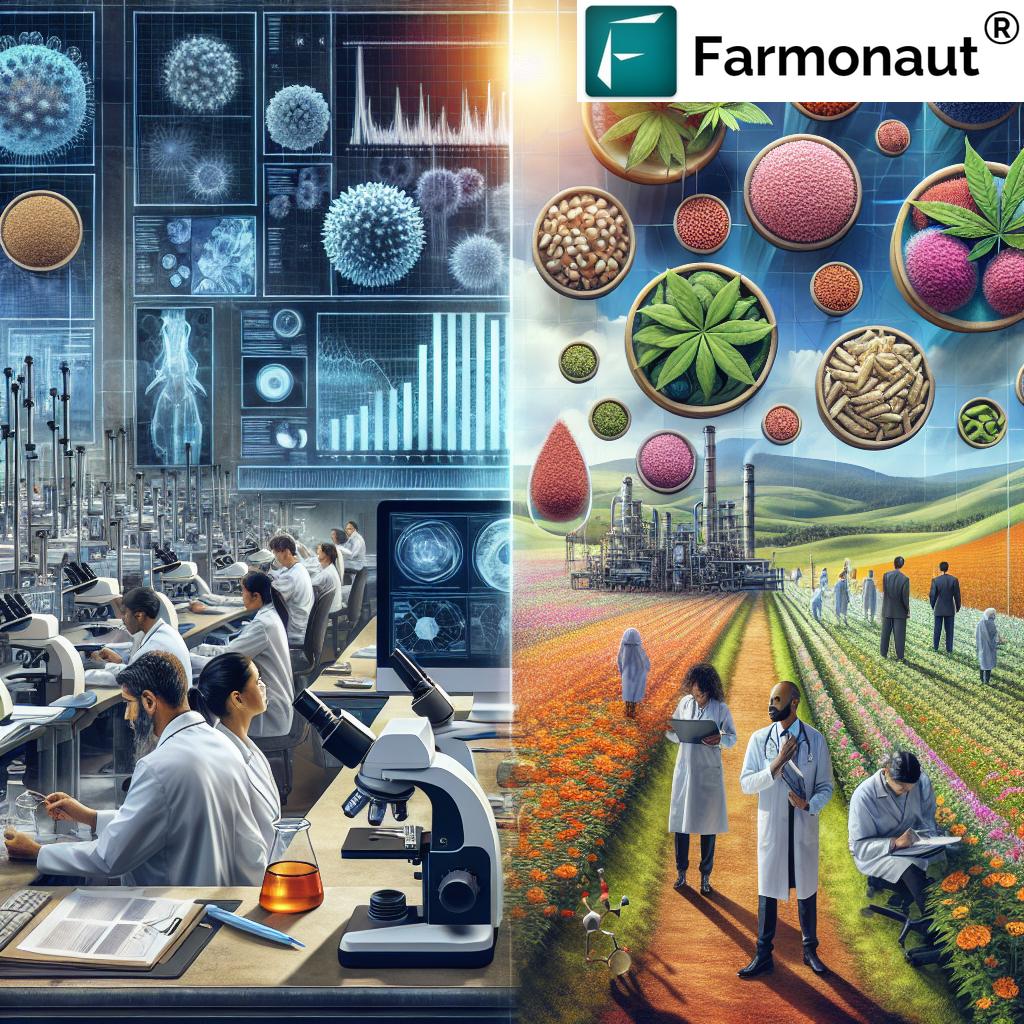Groundbreaking Australian Research: Tea Tree Oil’s Potential as Natural Anticancer Treatment
“Australian research shows tea tree oil from Melaleuca alternifolia may have anti-tumor properties when tested on mice.”
In the realm of agricultural innovation and medical advancement, Australia continues to lead the way with groundbreaking research that bridges the gap between rural development and cutting-edge healthcare solutions. We’re excited to delve into a fascinating study that explores the potential of tea tree oil (TTO) as a natural anticancer treatment. This research not only showcases the intersection of agritech and medical science but also highlights the immense potential of Australia’s natural resources in contributing to global health solutions.
The Power of Melaleuca alternifolia: More Than Just a Pleasant Aroma
Tea tree oil, derived from the leaves of Melaleuca alternifolia, has long been recognized for its antimicrobial and anti-inflammatory properties. However, recent agricultural research projects conducted by a leading Australian university have unveiled an exciting new dimension to this versatile oil – its potential as a natural anticancer treatment.

This groundbreaking study, funded by AgriFutures Australia, exemplifies the country’s commitment to harnessing its natural resources for both agricultural and medical advancements. The research team has been investigating the anti-tumor properties of TTO, optimizing its administration in mice models, and exploring its mechanisms of action on various types of cancer cells.
Bridging Agriculture and Medicine: The Role of Agritech
As we witness this exciting development in the world of tea tree oil benefits, it’s crucial to understand the role that agritech plays in facilitating such innovations. Companies like Farmonaut are at the forefront of revolutionizing agriculture through technology, enabling more efficient and sustainable farming practices that can support the production of high-value crops like tea tree.
Farmonaut’s satellite-based crop health monitoring and AI-driven advisory systems can be instrumental in optimizing the cultivation of Melaleuca alternifolia, ensuring the highest quality tea tree oil production. By leveraging these agritech innovations, farmers can maximize yields and quality, potentially contributing to the advancement of natural anticancer treatments.
The Promise of Tea Tree Oil in Cancer Research
The university’s research into TTO’s anticancer properties is multifaceted, focusing on several key areas:
- Optimizing TTO administration for maximum efficacy
- Investigating the mechanisms of action on various tumor types
- Exploring potential synergies with existing chemotherapeutic agents
- Assessing the oil’s ability to enhance the immune system’s response to cancer cells
Preliminary results have shown promising outcomes, with TTO demonstrating the ability to inhibit tumor growth in certain types of cancer. This research not only opens new avenues for cancer treatment but also highlights the potential for Australian agricultural exports to make significant contributions to the global health industry.
Sustainable Farming Practices: The Foundation of Innovation
At the heart of this groundbreaking research lies a commitment to sustainable farming practices. The cultivation of Melaleuca alternifolia for tea tree oil production exemplifies how rural lands can contribute to cutting-edge medical treatments while maintaining ecological balance.

Farmonaut’s precision agriculture tools play a crucial role in promoting sustainability in tea tree farming. By providing real-time insights into crop health, soil moisture levels, and weather patterns, farmers can optimize their resource use, reducing water consumption and minimizing the need for chemical inputs.
The Intersection of Agriculture and Health: A Growing Trend
The exploration of tea tree oil’s anticancer properties is part of a broader trend in alternative crop development and the search for natural health solutions. This research exemplifies how the agricultural sector can contribute to medical advancements, creating new opportunities for rural communities and expanding the potential of Australian exports.
As we continue to uncover the hidden potentials of natural compounds, it’s clear that the future of healthcare may lie in the careful cultivation and study of plants like Melaleuca alternifolia. This research not only offers hope for cancer patients but also demonstrates the value of investing in agricultural research and development.
Expanding Horizons: Beyond Tea Tree Oil
While the focus of this groundbreaking research is on tea tree oil, it’s important to note that Australia’s agricultural landscape is rich with potential for similar discoveries. From the vast outback to the fertile coastal regions, the country’s diverse ecosystems harbor a wealth of plant species with untapped medicinal properties.
“Tea tree oil study exemplifies the potential for rural lands to contribute to cutting-edge medical treatments in Australia.”
This research into TTO’s anticancer properties could pave the way for further exploration of other native Australian plants, potentially leading to a new era of natural medicine development. As we look to the future, the integration of agritech innovations like those provided by Farmonaut will be crucial in identifying, cultivating, and studying these promising plant species.
The Role of Precision Agriculture in Medical Plant Cultivation
The cultivation of medicinal plants like Melaleuca alternifolia requires precise management to ensure the highest quality and potency of the extracted compounds. This is where precision irrigation techniques and advanced crop monitoring systems become invaluable.
Farmonaut’s satellite-based monitoring system can provide farmers with real-time data on crop health, allowing for timely interventions and optimal growing conditions. This level of precision not only improves yield and quality but also ensures consistency in the medicinal properties of the harvested plants.
Explore Farmonaut’s API for advanced agricultural insights
Challenges and Opportunities in Tea Tree Oil Research
While the potential of tea tree oil as a natural anticancer treatment is exciting, it’s important to acknowledge the challenges that lie ahead. These include:
- Scaling up production to meet potential demand
- Ensuring consistent quality across different batches
- Navigating regulatory pathways for medical approval
- Addressing potential side effects and contraindications
However, these challenges also present opportunities for innovation in the agricultural and biotechnology sectors. For instance, the need for scaled production could drive advancements in industrial hemp applications, as hemp cultivation techniques could potentially be adapted for large-scale tea tree farming.
The Future of Australian Agricultural Exports in Health
As research into tea tree oil’s anticancer properties progresses, we may see a shift in Australia’s agricultural export landscape. The potential for high-value medicinal exports could transform rural economies and position Australia as a leader in natural health solutions.
Access Farmonaut’s API Developer Docs for integration into your agricultural projects
This emerging field presents exciting opportunities for collaboration between farmers, researchers, and technology providers like Farmonaut. By leveraging advanced agricultural technologies, Australia can ensure the sustainable and efficient production of these valuable medicinal crops.
Pest Management in Medicinal Plant Cultivation
One of the critical aspects of producing high-quality tea tree oil for medical applications is effective pest management in agriculture. Traditional chemical pesticides may not be suitable for plants intended for medicinal use, making integrated pest management strategies essential.
Farmonaut’s AI-driven advisory system can play a crucial role in identifying pest threats early and recommending organic or biological control methods. This approach not only protects the crops but also ensures the purity of the final product, which is paramount for medical applications.
Comparative Analysis: Tea Tree Oil Properties and Applications
| TTO Property | Traditional Use | Potential Anticancer Application |
|---|---|---|
| Anti-inflammatory | Skin conditions, wound healing | Reducing tumor-associated inflammation |
| Antimicrobial | Treating infections, acne | Preventing secondary infections in immunocompromised patients |
| Antioxidant | Anti-aging skincare | Protecting healthy cells from oxidative stress during treatment |
| Administration Method | Topical application, aromatherapy | Oral administration, direct injection (in animal studies) |
| Effective Dosage | Varies by application (typically 5-10% for topical use) | Under investigation (estimated 10-50 mg/kg in mouse studies) |
The Role of Blockchain in Ensuring Quality and Traceability
As tea tree oil potentially transitions from a conventional agricultural product to a valuable medicinal resource, ensuring its quality and traceability becomes paramount. Farmonaut’s blockchain-based traceability solutions could play a crucial role in this aspect, providing a transparent and tamper-proof record of the oil’s journey from farm to laboratory.
This level of traceability not only ensures the authenticity of the product but also allows researchers to correlate the oil’s efficacy with specific growing conditions, harvesting methods, and processing techniques. Such detailed information could be invaluable in optimizing the production of high-quality, medically effective tea tree oil.
Collaboration Between Agriculture and Medical Research
The potential of tea tree oil as an anticancer agent underscores the importance of collaboration between agricultural scientists and medical researchers. This interdisciplinary approach could lead to more holistic and innovative solutions in both fields.
For instance, insights from medical research could inform agricultural practices, leading to the cultivation of tea tree varieties with enhanced medicinal properties. Conversely, agricultural innovations could make it possible to produce larger quantities of high-quality tea tree oil, facilitating more extensive clinical trials and potential therapeutic applications.
Environmental Considerations in Tea Tree Oil Production
As the demand for tea tree oil potentially increases due to its medicinal properties, it’s crucial to consider the environmental impact of scaled production. Sustainable farming practices will be essential to ensure that the cultivation of Melaleuca alternifolia does not lead to deforestation or soil degradation.
Farmonaut’s precision agriculture tools can contribute significantly to environmental stewardship in tea tree farming. By optimizing resource use and minimizing waste, these technologies can help maintain the ecological balance while meeting the growing demand for this valuable oil.
FAQs
- Q: What is tea tree oil, and where does it come from?
A: Tea tree oil is an essential oil derived from the leaves of Melaleuca alternifolia, a tree native to Australia. - Q: How does tea tree oil potentially fight cancer?
A: Research suggests that tea tree oil may have anti-tumor properties, potentially inhibiting cancer cell growth and enhancing immune response. - Q: Is tea tree oil currently used in cancer treatment?
A: While promising, tea tree oil is not yet an approved cancer treatment. Research is ongoing to determine its efficacy and safety for this purpose. - Q: How does agritech contribute to tea tree oil production?
A: Agritech solutions like Farmonaut’s satellite monitoring and AI advisory systems can optimize tea tree cultivation, ensuring high-quality oil production. - Q: Are there any risks associated with using tea tree oil?
A: Tea tree oil can cause skin irritation in some people when applied topically. Its safety for internal use is still being studied.
Conclusion: A Promising Future for Australian Agriculture and Health
The groundbreaking research into tea tree oil’s potential as a natural anticancer treatment represents a significant milestone in the intersection of agriculture and medicine. It showcases Australia’s commitment to innovation and highlights the untapped potential of its natural resources.
As we move forward, the role of agritech companies like Farmonaut will be crucial in supporting the sustainable and efficient production of high-value crops like Melaleuca alternifolia. By leveraging advanced technologies and data-driven insights, we can ensure that Australia remains at the forefront of agricultural innovation and continues to make valuable contributions to global health solutions.
The journey from farm to pharmacy is complex, but with continued research, sustainable farming practices, and technological support, tea tree oil may one day play a significant role in cancer treatment, opening new avenues for both agricultural exports and medical advancements.
















